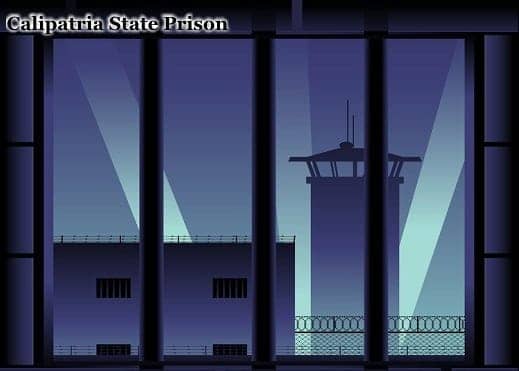by Kendra Castaneda

It’s so isolated the prison authorities can do anything they want to the ASU inmates without anyone knowing. They use the ASU to house the men they are holding longer than the “temporary” time. For example, almost all the men are validated – determined through a very flawed process to be members of a prison gang – and awaiting transfer to a SHU (Security Housing Unit).
They wait for years in ASU, while the men in Ad-Seg are mostly those “under investigation” or charged for a stabbing or a fight with a sentence of approximately one year in segregation. Ad-Segs are also attached to the prison itself so the conditions are not so protected from view as in a detached ASU building.
Conditions in Ad-Segs and ASUs vary widely from one prison to the next. Not every prison has an ASU, and some prisons with Ad-Segs are not as inhumane as others. The way the administration at a particular prison wants to run its segregation units determines their conditions.
Current inhumane conditions at Calipatria State Prison ASU (Administration Segregation Unit)
The men in the ASU unit wear dirty laundry; their boxers get changed approximately every three months. They are holey, dirty and gross.
The food is moldy, spoiled and rotten. Many men are not fed at all; the correctional officers state they “ran out of food.” The men in the corner cells are forced to go hungry most of the time.
There are no TVs or radios; therefore, hundreds of men are forced to stare at a concrete wall all day, which violates CDCR’s DOM (California Department of Corrections and Rehabilitation Department Operations Manual). Although these units are already equipped with cables, Warden Leland McEwen refuses to allow the inmates an appliance (radio or TV) in their cell to stimulate their minds while in complete segregation.
Almost all of the men in Calipatria’s ASU have been placed there on “suspicion” of prison gang activity, but even if they commit no gang-related act and are not being disciplined, they are held in complete “temporary” segregation for years.
They are allowed outdoors three times a week to “exercise” in dog cages, but that schedule is not kept. Many correctional officers pick and choose which men they want to allow outside, and their outside time is often cancelled due to staff meetings or staff barbeques.
Some of the men have been sitting in a concrete cell and denied permission to go outside to any yard for a long time.
The men in ASU are allowed to receive books through a vendor paid by a family member or friend. But for the many men who do not have anyone to buy books for them, they have an inmate exchange, where Level 4 inmates donate books for the ASU men. These books frequently have pages ripped out, and the library’s selection of books isn’t sufficient for 200 men. Many men have read the same book 100 times. An inmate in ASU can only have one book in his cell a week, and the trading books with another inmate is difficult. The prison does not routinely allow them even to exchange their own books with each other.
There is only one nail clipper for 200 men to share, and the correctional officers do not clean the clipper.
There is only one hair clipper for 200 men to share, and the correctional officers do not clean that either.
The tiers are extremely dirty, and the correctional officers refuse to clean them. In January 2011 the men purposely submitted to a forced “cell extraction” so the prison would be cleaned. The cells are unsanitary, and black widow spiders often find their way into the cells due to Calipatria being in the desert.
The men are forced to go outside in the winter desert cold with no shoes on, with their bare feet and no clothing but boxer shorts. The temperatures at Calipatria can get down to 32 degrees; it is cold and extremely windy in the winter time. The men are forced to wear nothing but boxers, and some do not get blankets in their freezing cold cells.

The men are not given proper medical treatment, for there is NO MEDICAL facility at Calipatria State Prison. Men in the ASU currently have broken bones, internal health problems, Hepatitis C and many need surgery. These men have been waiting in ASU for years in pain. The prison purposely ignores the men’s request slips for medical treatment.
The men in the ASU have been there for one year, two years, three or four years, and one man has been there for seven years straight. The men ask the ICC (Institutional Classification Committee) why they are not being transferred to Pelican Bay SHU. They beg to be transferred to the SHU, yet the response from Warden McEwen, Assistant Warden Anderson and IGI (Institutional Gang Investigator) Sgt. E. Duarte and by all the other IGIs is to “parole, debrief or DIE.”
After the second hunger strike, Warden McEwen ordered IGI Sgt. H. Groth and his fellow officers to walk around in the ASU harassing the inmates.
In the Calipatria ASU, Hispanic men are being falsely validated left and right by IGI Sgt. E. Duarte abusing his power. Out of 200 men in the ASU, there are about 10 Black men, a few white men, one or two classified by CDCR as “others,” and the rest – over 150 inmates – are Hispanic.
The only African American inmate in my husband’s pod in ASU, in cell 159, died a few weeks ago. The inmates are saying it was a cover-up. The prison originally said it was a suicide, but the men are saying it was no suicide.
This man was harassed on purpose by IGI Sgt. Groth and his fellow officers right before he mysteriously died. As of a few days ago, the inmates are saying the officers are now being ‘hush hush’ about the man’s death but the family of the man who died says this was no suicide.
Calipatria State Prison refuses to speak to the family. CDCR refuses to speak to the family or give the family any information pertaining to how he died. Calipatria’s Sgt. Garcia, who works at the coroner’s office, tells the family of the man who died that the autopsy reports will be available in six to nine weeks, and the family has already laid his body to rest. The family mentioned to me that their son took part in both of the hunger strikes; therefore, the autopsy report should show deterioration of certain body parts. But the family is being denied all of his death reports.
In the ASU unit, visits to the men are often cancelled on purpose, or the prison ignores family requests for the ASU men. Visits are stripped from many of the men due to false charges made against them; therefore, these men are forced to never see their families.
Almost all the men in the ASU have been classified already as validated “SHU status inmates.” They sit illegally in an ASU cell for years on end, being denied a transfer to a SHU facility. Due to their classification, it does not matter that the hold is supposed to be temporary. These men are stripped of their privileges as if they were in Ad-Seg and live under the same constraints as if they were in an actual SHU facility.
As of today, the Calipatria ASU is full. Their A5 segregation unit is for the “overflow,” and it is almost full. The prison has started to make plans to construct another ASU. If they do, there will be two ASUs and one A5 overflow unit.
The men at Calipatria ASU call that particular ASU the “ASU/SHU,” because they say it is worse than a SHU facility.
Kendra Castaneda is prisoner human rights activist with a loved one currently incarcerated at Calipatria State Prison ASU (Administrative Segregation Unit). She can be reached at kendracastaneda55@gmail.com.





